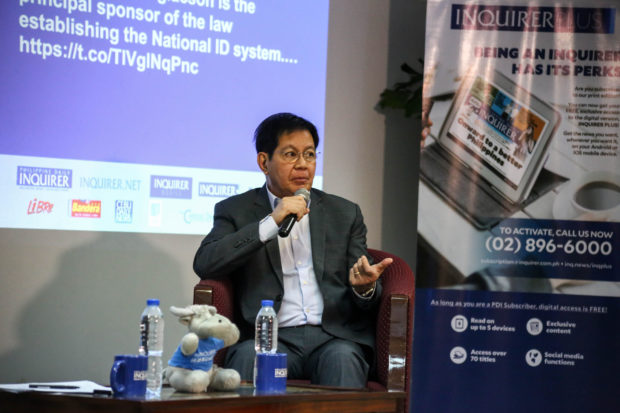Lacson: Expedite release of anti-terror law’s implementing rules

Senator Panfilo “Ping” Lacson. INQUIRER FILE PHOTO / JAM STA. ROSA
MANILA, Philippines — Senator Panfilo Lacson wants the Anti-Terrorism Council (ATC) to expedite the creation of the Implementing Rules and Regulations (IRR) for the Anti-Terrorism Act of 2020, saying an earlier release of the IRR may have prevented the deadly twin blasts in Jolo, Sulu on Monday.
Lacson, chairman of the Senate committee on national defense and security, advised the ATC not to exhaust the period allowed by the anti-terror law, which took effect on July 18, for the creation of its implementing rules.
“Sa ilalim ng batas, may 90 days. Sana huwag i-exhaust ang 90-day period. Kung kaya, tapusin na after one week,” he told DZXL on Thursday.
(Under the law, there is a 90-day period allowed for the creation of the IRR. I hope they will not exhaust the 90-day period. If possible, it should be finished after a week.)
“Kung sana may IRR, maga-guide ang law enforcement kung ano ang dapat gawin. Maski umiiral ang batas, kung walang guidelines, mahihirapan sila. Kasi paano nila masasagawa ang pagpapatupad ng Anti-Terrorism Act?” the senator added.
(If there was an IRR, the law enforcers would be guided on what to do. Even if the law is in effect, if there are no guidelines, they will find it hard to implement it. How can they enforce the Anti-Terrorism Act without it?)
Lacson pointed out that the military and the police need the IRR so they can have a guide in enforcing provisions of the anti-terror law. He said that security forces would have been able to utilize the implementing rules to take measures that would prevent the twin powerful explosions in Barangay Walled City that killed 15 and injured at least 75 others.
“Kung meron nang IRR, kumpleto na ang guidelines, IRR na mag-ga-guide sa mga military personnel. Assuming hindi nangyari ang patayan at naroon sila, di pa rin sila makagalaw,” he said.
(If there was an IRR, the guidelines would have been complete which would guide the military personnel. Assuming they were not killed and they were there, they would still not be able to act on it.)
Lacson noted that with the absence of IRR, security forces are likewise not guided on conducting electronic surveillance and in arresting suspected terrorists who are still in the planning stage of launching terror attacks.
“Kung sana may IRR at maliwanag na ito alam ng mga military at police officers natin, hindi ko sinasabing sigurado pero pwedeng hindi nangyari ang pagsabog, kasi pwedeng arestuhin dahil sinama natin sa bagong batas ang inchoate offense. Di pa nangyayari, pwede nang arestuhin dahil separate crime na ‘yan,” he explained.
(If there was an IRR and its implementation is clear to military and police officers, I am not saying it is a sure scenario, but the bombings may not have happened. They can effect arrest for inchoate offenses because we included that in the law. Even if the terrorist act has not yet been done, the offender can be arrested because it’s a separate crime.)
Philippine Army chief Lt. Gen. Cirilito Sobejana earlier disclosed that the two female suicide bombers that the military was trailing but lost track due to the death of its four intelligence officers in Jolo were the ones responsible for the August 24 blasts.
If the Army officers were not gunned down by the police in the June 29 incident, they would have been able to arrest the suicide bombers under the anti-terror law, according to Lacson.
“Kung noong panahon na ‘yan may guideline sa pamamagitan ng IRR, hindi ligaw ang ating law enforcement,” he said.
(If at that time, there was a guideline through the IRR, the law enforcers would not have been lost in its implementation.)
“Kung sapat na ang ebidensya nila at papasok sa warrantless arrest na tinatawag ang circumstances, ang condition, mga requirement, pwede sana nila maaresto ang female bombers,” added Lacson.
(If their evidence is already complete and the circumstances, conditions, and requirement fall under warrantless arrest, they would have been able to arrest the suicide bombers.)
Section 54 of the Anti-Terrorism Act, mandates the ATC— chaired by Executive Secretary Salvador Medialdea—and the Department of Justice to promulgate the IRR within 90 days after the law’s effectivity.
The crafting of the IRR must be done “with the active participation of the police and military institutions.”